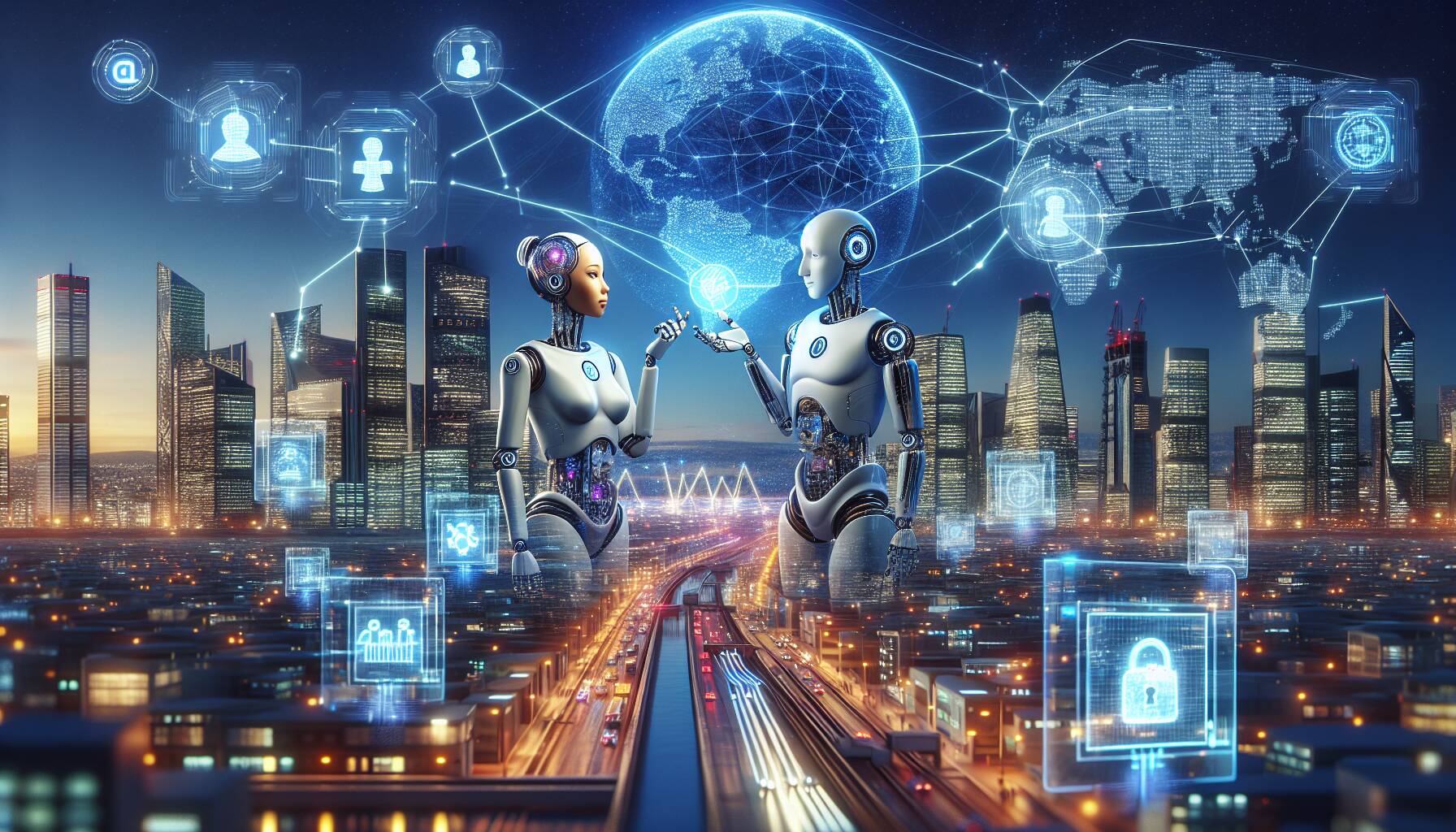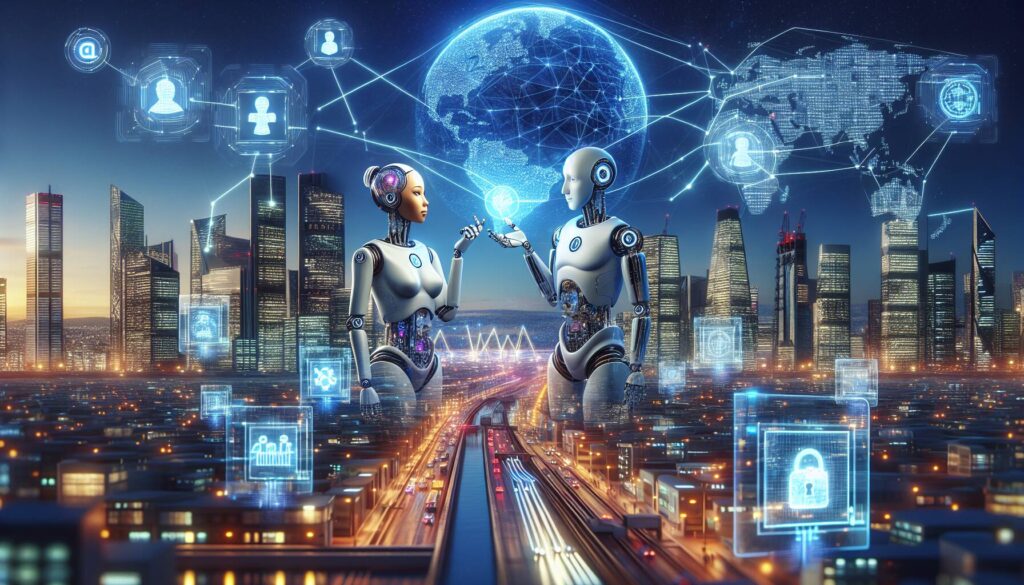In a groundbreaking shift poised to redefine how we buy and sell goods, Web3 technologies are stepping into the spotlight as catalysts for a new era of commerce. Much like the transformative journey from Web1 to Web2 revolutionized access to information, the rise of decentralized commerce promises to create an expansive digital marketplace where physical assets can be exchanged with unprecedented ease and transparency. This evolution suggests a future where trust is built into transactions, thanks to innovations such as blockchain and AI-driven commerce agents.
Historically, the world of commerce has struggled with complexities that have held it back from enjoying the same level of openness seen in information-sharing. Centralized intermediaries have long been necessary for ensuring security and settlement in traditional markets. However, the introduction of smart contracts and the tokenization of physical assets allows for a new, less restrictive framework. This empowers individuals and companies to engage in what could be described as trustless transactions—where the need for a middleman is effectively eliminated.
“AI agents will empower decentralized commerce by aggregating supply and demand, fostering seamless interactions between buyers and sellers.”
At the heart of this decentralized commerce revolution are AI commerce agents, which serve as indispensable players in the trading ecosystem. These intelligent systems not only streamline the discovery and transaction processes but also enhance overall user experiences by aggregating data from various platforms. They analyze consumer behavior and preferences, seamlessly connecting buyers with the products they want in a much more efficient manner than traditional ecommerce has allowed.
The synergy between crypto and AI is particularly noteworthy. As artificial intelligence takes on a more prominent role in managing commerce transactions, it benefits from the secure and verifiable backbone that blockchain technology offers. This combination creates an environment where operations can be trusted, even when performed autonomously by AI agents. Essentially, while AI enhances user interfaces and simplifies interactions with cryptocurrency systems, blockchain ensures the integrity of transactions.
As decentralized commerce unfolds, it may begin with efforts to draw users away from established e-commerce platforms—an approach likened to Airbnb’s initial strategy of leveraging Craigslist’s inventory to build its own platform. Over time, as these new systems mature, we may witness a direct displacement of traditional marketplaces, driven by their superior efficiency and openness.
Looking ahead, the vision of a universal marketplace is becoming clearer. As we embrace decentralized, AI-powered commerce, limitations tied to geography and platform restrictions are likely to diminish. This evolution not only democratizes access for participants but also redistributes value created within the marketplace, moving away from concentration in centralized entities. The future of commerce is indeed a promising one, heralding the advent of a global marketplace where the boundaries of traditional trade are redefined.

The Future of Decentralized AI Commerce
The shift towards Web3 technologies presents significant changes in the way commerce operates, much like the transition from Web1 to Web2 influenced information accessibility.
- Decentralized Marketplace Transformation:
- Web3 technologies, mainly driven by blockchain, enable a vast, open marketplace for physical goods.
- Smart contracts automate transactions, eliminating the need for centralized intermediaries.
- AI Commerce Agents:
- AI agents aggregate supply and demand, facilitating trade across decentralized protocols.
- Provide insights into market trends, improving decision-making for buyers and sellers.
- The Synergy of Crypto and AI:
- Crypto offers secure, verifiable transactions that enhance trust in AI-driven commerce.
- AI simplifies interactions with blockchain technology, making it accessible to non-technical users.
- Phases of Decentralized AI Commerce:
- The first phase involves “vampire attacking” existing platforms by scraping data to build a decentralized inventory.
- As decentralized protocols mature, they will disrupt and replace traditional marketplaces by offering superior efficiencies.
- Universal Marketplace Emergence:
- The future marketplace will be global and liquid, free from geographic and platform restrictions.
- Access to commerce will democratize, redistributing value among all participants instead of centralized entities.
The merging of AI and decentralized systems has the potential to reshape commerce, similar to how the internet transformed information sharing.
Decentralized AI Commerce: Transforming the Marketplace Landscape
In today’s rapidly evolving digital landscape, the advent of decentralized AI commerce is setting itself apart from traditional e-commerce platforms. This new paradigm promises to usher in a marketplace that rivals the internet’s impact on information accessibility. The primary advantage lies in its ability to streamline transactions by leveraging blockchain technology and AI, facilitating trustless exchanges without the need for centralized intermediaries.
Competitive Advantages: One of the standout benefits of decentralized commerce is the elimination of intermediary costs associated with traditional platforms. By utilizing smart contracts and AI-driven agents, participants can seamlessly list and trade physical and digital assets while enjoying enhanced security and transparency. Additionally, AI agents play a pivotal role by aggregating data, optimizing supply-and-demand matches, and facilitating cross-platform transactions, which ultimately creates a more efficient marketplace. This ecosystem not only empowers sellers and buyers with better insights but also democratizes access to commerce by removing geographical and platform constraints.
In contrast to established platforms, decentralized commerce disrupts the norm through its innovative approach. Much like Airbnb’s initial strategy of “vampire attacking” Craigslist by capturing data and creating an independent ecosystem, decentralized commerce aims to disrupt existing marketplaces by harnessing advanced technology. This model positions innovative startups at an advantage, as they can leverage AI and blockchain from the ground up, appealing to a contemporary audience that seeks transparency and operational efficiency.
Competitive Disadvantages: However, it is important to consider some challenges that this emerging sector may face. The complexity inherent in managing and navigating decentralized systems may deter less tech-savvy users, potentially limiting adoption among certain demographics. Trust is equally paramount, as users accustomed to the reassurance of established platforms may harbor skepticism regarding the efficacy of smart contracts and the interaction of AI agents with blockchain protocols. Additionally, legal and regulatory uncertainties surrounding cryptocurrency and decentralized commerce could pose hurdles as these technologies continue to evolve.
Impacts on Stakeholders: The benefits of decentralized AI commerce span across various groups. Tech-savvy entrepreneurs and consumers seeking open, efficient marketplaces will find themselves at the forefront of this innovation. Moreover, businesses looking to reduce operational costs and enhance transparency in transactions can leverage these emerging platforms to better compete in the global arena. Conversely, established e-commerce giants may face significant disruptions to their business models, as the streamlined nature of decentralized commerce challenges their dominance and depends on consumer trust and brand loyalty.
As decentralized AI commerce begins to reshape the marketplace, its potential to establish a universal and inclusive digital ecosystem is becoming more evident. Stakeholders must stay informed and adaptable to thrive in this dynamic environment where traditional barriers are lowered, and trade evolves into a more interconnected experience.
















